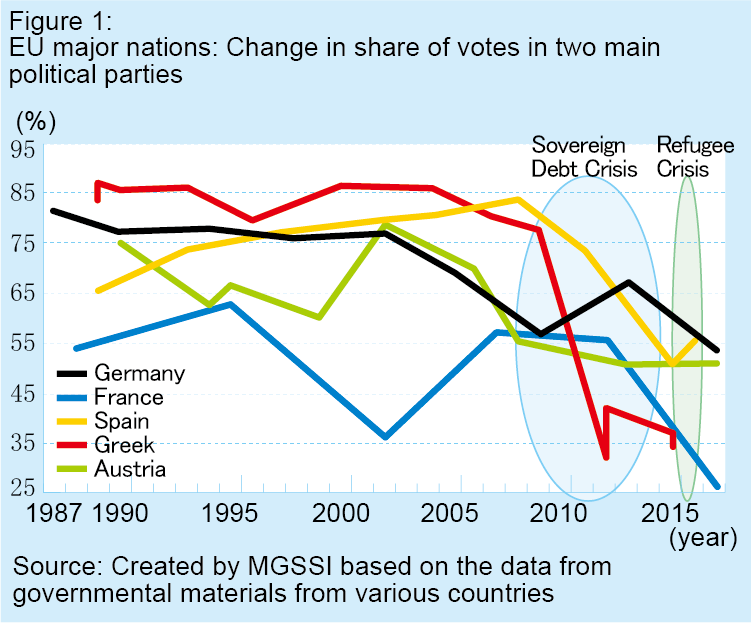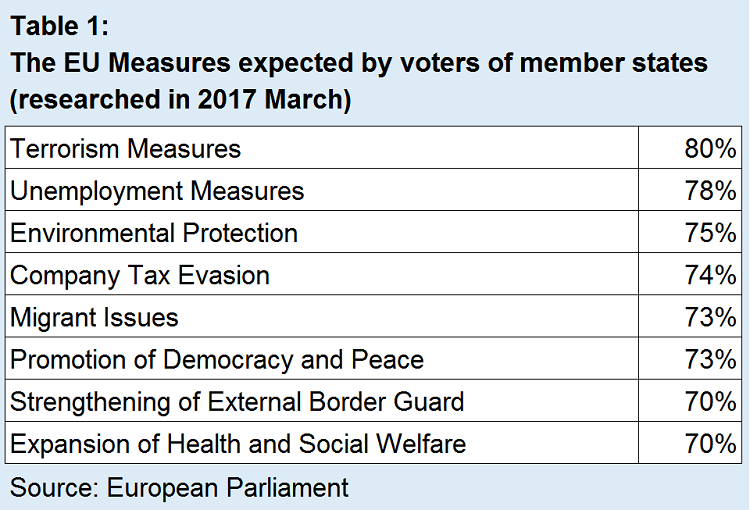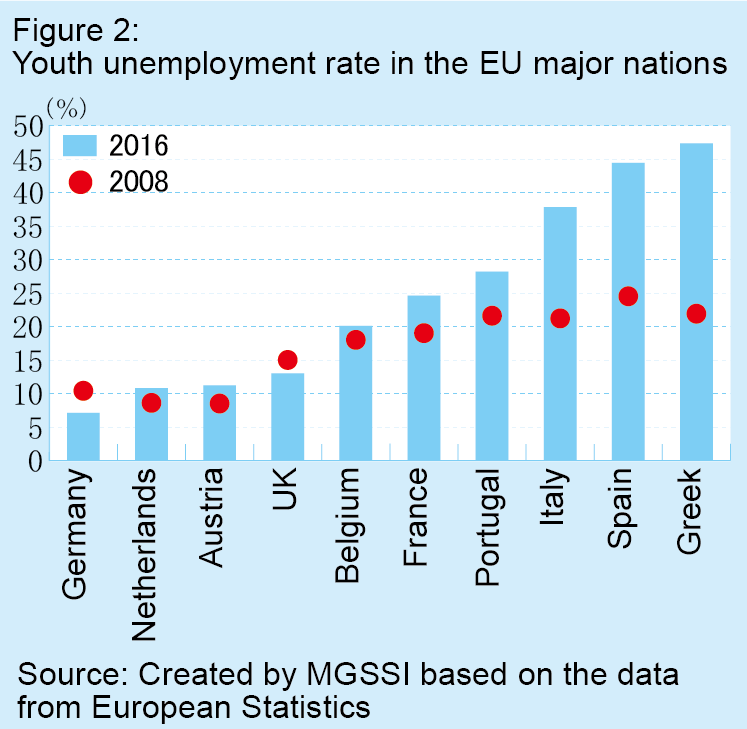Mitsui & Co. Global Strategic Studies Institute
New Directions for the EU Seen in 2017 Election Results
Dec. 8, 2017
Yosuke Inuzuka
EMEA & Russia Dept.
Mitsui & Co. Global Strategic Studies Institute
Main Contents
Across the major EU member states, there has been a series of key elections throughout the year 2017, whereby voters have chosen a new administration. That 2017 election season has now come to an end. Looking at those results, the pro-European parties narrowly won, which allowed the EU to maintain the driving force behind European integration. However, during electoral campaigns in Germany, France, the Netherlands, and Austria, the support for Eurosceptic parties largely surged, due to the campaign promise to strengthen correction for social disparities and measures against migrants. Behind the narrow victory of the pro-European parties is the fact that voters started to become wary of such circumstances, when seizure of political power by Eurosceptic parties became more of a real possibility in the final phase of those campaigns. Currently, the EU, steered by Germany and France, intends to step up efforts to reinstate initiatives towards further integration of Europe by implementing policies including security measures and eurozone reform. If the effectiveness of the EU cannot be materialized markedly within 4-5 years by the next election, then Eurosceptic parties could acquire a position of power in the next elections. What are the critical challenges facing the EU in the future? Considering recent election results and the political environment of the EU member states, this paper aims to provide an outlook for the EU, focusing on the current issues facing the EU as well as its reform proposals.
Upsurge of Populist Parties, Decline of Existing Parties

In Europe in 2017, elections were successively held: Dutch general elections in March; French presidential and legislative elections from May to June; German federal elections in September; Austria parliamentary elections in October; and Czech legislative elections in October. Even in the UK, which decided to leave the EU, a snap election was held in June. Excluding the UK, all of those elections resulted in an upsurge of Eurosceptic parties, and an increase in their influence on national politics.
In Germany, the Christian Democratic Union/Christian Social Union (CDU/CSU), led by Chancellor Angela Merkel, secured a leading position in the parliament, while the Alternative for Germany (AfD), with a harsh migrant policy, won 12.6% of the vote (94 seats) and entered parliament as the third largest party. Meanwhile, France’s presidential election saw 39-year-old Emmanuel Macron victorious, while Marine Le Pen, the leader of Front National indeed gained 33.9% of the vote in the final round of the election, and even 21.3% in the first round. Including left-wing radical Jean-Luc Mèlenchon’s 19.6% vote, so-called populist politicians in France gained above 40% support in total. In the Netherlands, the anti-Islam Party for Freedom (PVV) won 13.1% of the vote and was set to be the second largest political party. Likewise, the Freedom Party of Austria (FPO), a populist party in Austria, having a strict policy against migrants, gained 26.0% of the vote and entered parliament as the third largest party. Therefore, FPO is in a coalition government now.
Behind the upsurge of Eurosceptic parties, it can be pointed out that voters who feel they do not have a promising future, suffering from financial difficulties in everyday life, had a strong desire for breaking through the current situation. As a domestic issue in the EU member states, the widening income gap and regional disparity, which stem from several factors in globalization, are becoming apparent. In fact, since the European sovereign debt crisis started in 2008, austerity measures have been introduced in many of those member nations, and thereby, social security costs has been cut and voters’ everyday life has become a struggle. In addition, since the autumn of 2015, more than one million refugee applicants have been rushing to Europe, which has increased voters’ vague anxiety about their security and employment.
The Eurosceptics, the so-called populist parties, are the very force that acts as a vessel to receive the dissatisfaction of those “forgotten people.” Because of the prevalence of social media, values have become diversified and segmentalized. This trend brings about increasing difficulties for politicians to play a role in representing as many voters as possible and responding to every voter preference. The established political parties are apt to adopt please-everyone policies, while the populist parties rejected tolerance, which has been the basis of the EU integration. Consequently, those populist parties have been able to penetrate into the heart of those “forgotten people” by presenting an extremely simplified assertion. This means that they have been provoking antagonism between two sides, setting up a simple structure of “Us versus Them (elites)”, “Christianity versus Islam,” targeting elite people who cannot change reality by themselves, as well as refugees and migrants. Regardless of the correctness of such assertions, this definitely could have appealed to the sentiment of those “forgotten people.” And they surely should have believed that the populist parties represent the voices of dissatisfaction in everyday life. On the other hand, their intolerant and confrontational attitude has intensified national segmentation and, as a result, caused difficulty in achieving consensus building based on consideration.
A more serious factor underlying this situation is the lowering centripetal force of the two major parties, the center-right and the center-left, which have so far been taking the lead in building public consensus. In the early 1990s, those parties gained 60-80% of the vote in each country. However, in 2017, that rate dropped to the 50% level in Germany and Austria, while in France, it dropped to 26.4% (the first round of the presidential election) (Figure 1). One example is that such centripetal force is affected by the right and left wing populist forces. Some members of the Republican Party tilt to the right, while some members of the Socialist Party tilt to the left. They have a confrontation with moderates, and those centripetal forces are facing a critical situation such as withdrawal of member politicians from the party and the breakup of the party. Further intensified segmentation and an upsurge of political parties allows for continued unproductive policy dispute. This could lead to the situation where “indecisive politics” become the norm. Political distrust could play a role in fostering more extreme populist forces. The challenges to every leader of the EU member states are how to fill the gaps within the country and overseas, with cooperation and tolerance, which are fundamental values of the EU, how to demonstrate the effectiveness of EU solidarity in a way that voters can see, and how to intensify EU integration irreversibly.
Reform in France Carries Much More Political Weight in France

The biggest problem is that there are only 4-5 years remaining to implement EU reform until the next election year in each nation. On September 13, 2017, European Commission President Jean-Claude Juncker made key proposals in his annual State of the European Union address, saying, “We now have a window of opportunity but it will not stay open forever.” In other words, he urged those members to seriously tackle EU reform while the influence of Eurosceptic parties is still limited.
French President Macron is the very person who takes the lead in EU reform. In a September 26 speech, he addressed the future of the EU. In that speech, he set out initiatives to strengthen security and reform the eurozone. Regarding the security field, in the light of the influx of refugees and terrorism countermeasures, he called for building up the external border guard and control system as well as the refugee acceptance system, which are shared by all EU member states. In the military field, he proposed the creation of a military intervention team shared by all EU countries, building a common military budget and code of conduct. In terms of the economic aspect, he upheld the creation of a common budget in the eurozone and establishing the position of eurozone finance minister.
The biggest results can be easily expected in the security field. Most EU member states signed the Schengen Agreement, which secures the free movement of people within the EU. Meanwhile, the control of the EU’s external borders has been in the hands of each corresponding country, and therefore, the border in some areas cannot be sufficiently managed. Moreover, many member nations are reluctant to share confidential information due to language barriers and privacy policies. In that sense, it is difficult to capture terrorists and criminals who have already entered into the Schengen area. Looking at the current situation in Europe, large-scale terrorism has already occurred in Paris, Nice, and Berlin. So, people increasingly voice a strong desire to promote terrorism countermeasures led by the EU. An opinion poll by the European Parliament shows that 80% of the voters in EU member states call for the terrorism countermeasures (Table 1). Border control and terrorism are topics which easily attract voters’ attention, and thereby the EU can gain their support. Turning our eyes to the military aspect, the emergence of the Trump administration caused new friction between the US and Europe. That is a factor that can be expected to encourage stepwise integration in terms of budget, military equipment, and chain of command. Furthermore, the perspective of the UK, which left the EU, taking the stance of putting an emphasis on NATO, and thus opposing the EU security alliance, might possibly be a factor to stimulate discussion among people.
On the other hand, economic reforms seem less likely to be realized at this moment. Germany strongly opposes the introduction of a common budget within the eurozone in order to encourage investment and employment, seeing such introduction as nothing but budget transfer to the southern European countries with relaxed financial regulations. Because of similar reasons, Germany also opposes burden-sharing for the deposit insurance system that the European Commission is proposing as a part of the effort to complete the banking union.
Although sometimes Germany’s assertions are criticized as dogmatic, even behind such assertions, we can find some reasonable circumstances that are worth considering. According to the Eurostat, among the major countries in the eurozone in 2016, there are only a few countries which maintain a fiscal surplus, i.e., Germany, the Netherlands, Luxembourg, and Greece. (As an exceptional case, Greece’s fiscal balance was obliged to be in the black as a requirement for financial support.) Considering the economic scale, it is obvious that each country expects to rely on German financial power. Even if the measures to redistribute wealth within the region is aimed at an improvement in the growth of the whole EU, it is understandable that the anti-euro party AfD, as well as major German parties which are confronting AfD, take a negative stance on that measure. Some may say that France and Germany are making collaborative efforts; however, they only support the general idea of strengthening the EU integration, while in detail, they are taking different stances from each other.
Therefore, what is really important for intensifying EU integration in the future is that France gets back on a recovery track. The Macron administration envisions initiatives to move the growth strategy forward by launching reforms in the labor market and further in the tax system. If France gets back on a recovery track and takes the initiative for EU reforms, it will become easier to elicit cooperation from Germany, which is reluctant to stand out and favors collaborative efforts. Although, in the short-term future, the direction of the EU depends on the progress of reforms in France, President Macron’s method to promote reforms is garnering high expectations. However, there is also the fact that it is not easy to implement various kinds of reforms which every president has been forced to give up conducting because of encountering a lot of resistance.
Intensified Rift, Crucial Moment for Promoting EU Integration

Even if France gets back on a recovery track and embarks on its reforms, the road ahead is not a smooth one. The biggest concern is that the number of EU countries was six at the beginning but has expanded to 28, and therefore, consensus building has become difficult under the principle of unanimous consensus in the EU. In particular, Poland and Hungary are insisting on maintaining their own values rooted in Christianity. They show their resistance to Germany and France by adopting illiberal policies, as seen in the rejection of a mandatory quota system for the relocation of refugees and migrants, and strengthening legislative framework and media control. Furthermore, they raise objections to reform proposals led by Germany and France, because there is a likelihood that they will be forced to follow the values of those countries, which do not sufficiently support their views in creating proposals. Recently, Austria and the Czech Republic are also advocating a strict migrant policy, which is becoming more akin to that of Poland and Hungary. This move will inevitably strengthen the conflict between east and west within the EU.
The economic disparity between north and south has also become a potential threat to the situation of the EU. Compared with Germany and other financially sound countries, France, Italy, Spain and Portugal are forced to introduce austerity measures. Therefore, alternative options for an economic stimulus package created under financial policy are limited to those countries. The youth unemployment rate (15-24 year-olds) is also one of the biggest issues in Europe. Looking at Figure 2, the southern European countries have an overwhelmingly higher rate than the north part of Europe. Recent populist parties are inclined to refrain from expressing blatant racist comments. That is why the young adult generation has less resistance to those parties compared with the middle-aged and older generations, who know their extreme assertions in the past. Although it is important to improve the situation of such economic disparity also for the purpose of suppressing Eurosceptic parties, differences in recognition of the current situation could be a barrier to promoting the implementation of common policy.
On top of that, recently there have been independence issues in Catalonia, Spain (state capital, Barcelona), and movements calling for greater autonomy in Lombardy, Italy (state capital, Milano), and Veneto, Italy (state capital, Venice). One of the factors behind such movement is that all of the above states are wealthy regions, and therefore, people living there feel dissatisfaction with the government’s redistribution of wealth or tax revenues. Although under the current situation there seems almost no chance that those areas will become independent, such intensified rifts at the regional level could have a centrifugally psychological impact on EU integration.
On January 31, 2017, EU President Donald Tusk addressed a letter to the 27 EU heads of state or government, stating, “It must be made crystal clear that the disintegration of the European Union will not lead to the restoration of some mythical, full sovereignty of its member states, but to their real and factual dependence on the great superpowers: the United States, Russia and China.” He called for the need to “take assertive and spectacular steps that would change the collective emotions and revive the aspiration to raise European integration to the next level” through promoting reforms. In 2018, the EU will stand at a crucial point, heading toward the urgently needed reform of the EU.